
Western Kentucky University
Welcome, everyone both here and on our regional campuses in Glasgow, Elizabethtown, and Owensboro. Welcome to our 2013 Opening Faculty and Staff Convocation, and to the opening of a new academic year at WKU. This is the one time each year when our faculty and staff come together to acknowledge some of our successes in the past year and anticipate opportunities and strategies in the coming year.
As we begin, I want to acknowledge and greet all of you by groups. First, will members of our Board of Regents who are with us this morning please stand. Will members of our Administrative Council, our university's senior officers, please stand? I also want to acknowledge the deans of our respective colleges. Next, I would like to ask all of our new faculty and staff just beginning their WKU employment to please stand and let us welcome you to the WKU family. Next, will all members of our esteemed faculty—instructors, assistant professors, associate professors, and full professors—please rise. Finally, if you are a member of our staff or an administrator at WKU, please stand and let us acknowledge and thank you for your service to WKU. Thank you all.
She does not fall into any of these categories, but yet works exceedingly hard for WKU day in and day out. I want to acknowledge and thank Julie for her efforts on behalf of WKU, not only for the past year but for the past 16 years. She doesn't think too highly of the term "first lady" because she certainly embraces our mutual theme that no one at WKU works for anyone else; we all work for WKU while working with each other. She devotes her time to students and parents, and ensures that our guests are well-received and our events are well-orchestrated. She leads our WKU Sisterhood effort, which has helped fund a number of worthy programs to advance scholarship and outreach at WKU. So Julie, thank you—you are the hardest working Ransdell I know!
Before we get started, let's send up a cheer for Ogden College and the College of Health and Human Services who played each other in a five-inning softball game last week at Hot Rods stadium! It was great to see faculty and staff in both colleges having fun competing on the field. The College of Health and Human Services won 4-3 in a well-played game by both colleges!
The other colleges need to get ready because next year in our opening week, we'll have a one-day tournament for all of the colleges!
2012-2013, YEAR IN REVIEW
Last year, we had some incredible performances among our faculty, staff, and students and earned some outstanding national recognition. We also had to overcome some unexpected obstacles. As you know, we came together with a recommended tuition increase of five percent and a balanced budget without any reductions only to learn shortly thereafter that the Kentucky Council on Postsecondary Education would vote to cap resident tuition at three percent for all Kentucky public universities. Therefore in a matter of a few short weeks, we went back to the drawing board to cut some $2 million out of our budget in order to present a balanced budget to the Board of Regents in June. On a positive note, we were able to achieve this reduction without losing jobs, laying people off, or forcing unpaid furloughs. And, while we were unable to achieve a salary increase for all WKU employees, over a quarter of tenure-eligible faculty did receive a market-equity salary adjustment.
The other highly significant dynamic in our university profile last year was related to enrollment. We achieved a stable enrollment with a slight increase in total headcount but a modest decrease in overall revenues. While we were able to maintain a balanced budget, we studied very closely enrollment trends and projections as they relate to our enrollment profile. We came to some conclusions, which will adjust our enrollment goals going forward. More on that later.
Among what I believe to be our significant achievements this past year was the hiring of 45 new faculty at a time when many universities across the country are in budgetary retrenchment with hiring freezes and limited options for strengthening faculty lines. We are committed to increasing the number of full-time, tenure track faculty who are highly credentialed, and to reducing our dependence on adjunct faculty.
ACTION PLAN
I encourage all of you to review our Progress Report on our Convocation website, which outlines first-year progress in our 2012-2018 Action Plan. You will recall that this document was first released at this Convocation last year. It is our six-year roadmap. For those of you who are relatively new to WKU, we follow a corporate-like strategic planning process, which articulates our priorities and measures our progress. It is one of the ways in which we are accountable to both the public and to ourselves.
Strategic Plan Goals:
I think the important message in our Progress Report is that even in a year with limited financial capacity, when tough decisions were necessary, we were able to make significant progress toward the six-year measurables outlined in this plan.
CONSTRUCTION PROJECTS
We made considerable progress this past year on four construction projects including the opening of the Augenstein Alumni Center, which was funded by private gifts, and the renovation of the Downing Student Union, paid for in large measure by students. I encourage all of you to make your way into parts of the building that just opened this month including the new Fresh Food Company, Starbucks, YoBlendz, and the new WKU Store, which is now at street level along Avenue of Champions. The balance of the building will open next summer.
We will live one more year with the temporary Topper Café, which this year will accommodate the branded restaurants. Those will return to the Student Union next summer.
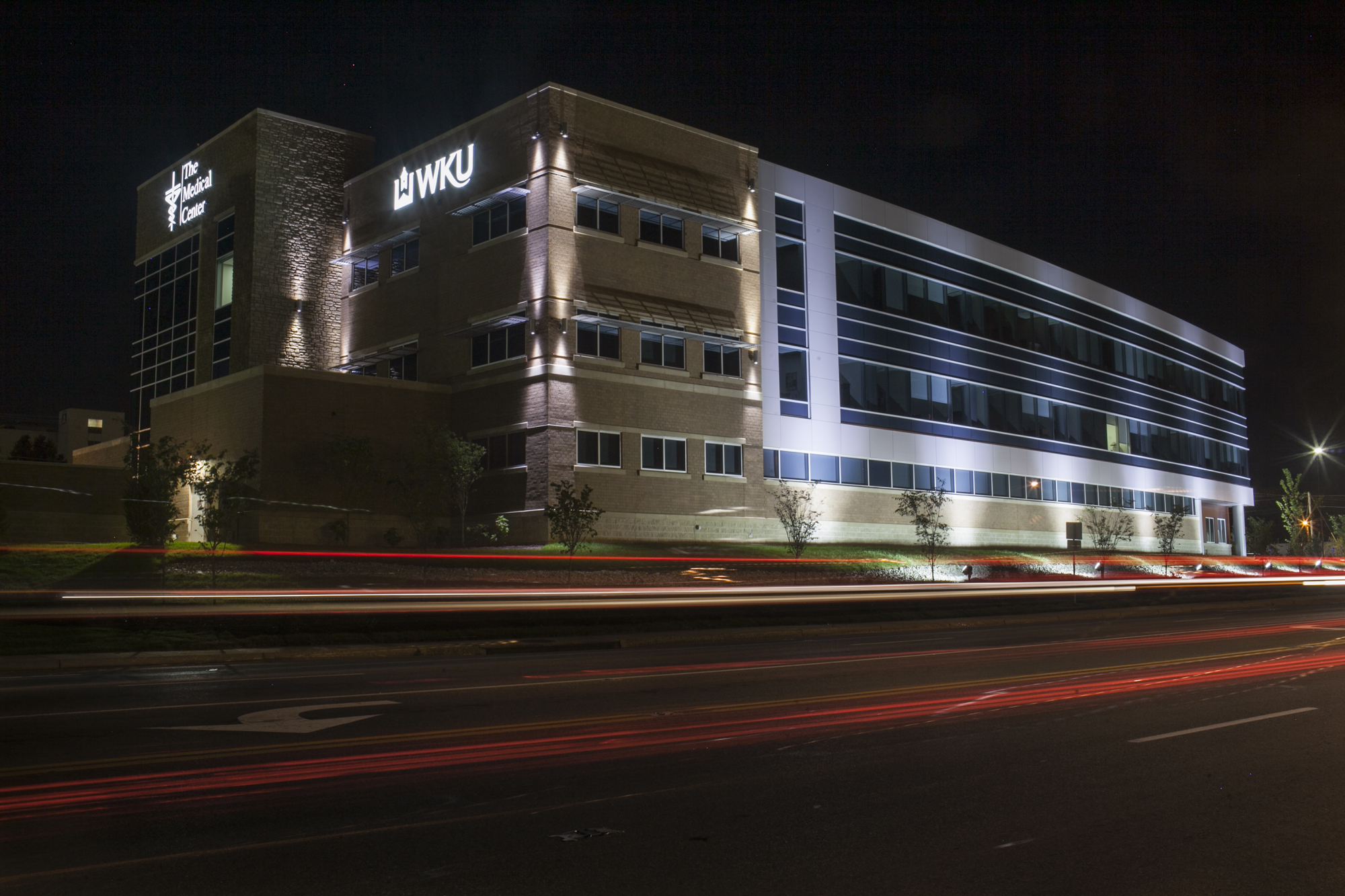 We just opened yesterday the new Medical Center-WKU Health Sciences Complex. This
building will house our School of Nursing baccalaureate, masters, and doctoral programs,
and our new Doctor of Physical Therapy program, which enrolled its first class of
30 students this summer. This building is owned by the Medical Center and leased by
WKU through tuition revenue from Nursing and DPT students and through Tax Incremental
Financing (TIF) revenues from the State and the City. The TIF has provided classic
examples of public/private partnerships to serve the public good.
We just opened yesterday the new Medical Center-WKU Health Sciences Complex. This
building will house our School of Nursing baccalaureate, masters, and doctoral programs,
and our new Doctor of Physical Therapy program, which enrolled its first class of
30 students this summer. This building is owned by the Medical Center and leased by
WKU through tuition revenue from Nursing and DPT students and through Tax Incremental
Financing (TIF) revenues from the State and the City. The TIF has provided classic
examples of public/private partnerships to serve the public good.
The final construction project currently under way is the new upper-class student and adult housing complex currently going up along Kentucky Street opposite similar apartments, which we completed last year. These two apartment-style residential complexes fill a void in our housing portfolio for senior-level and other adult students where the demand far outweighs the supply through our office of Housing and Residence Life. Congratulations to our Student Life Foundation for providing a sound financial model to meet the housing demands for our students.
YEAR END RESULTS
Some pertinent numbers from the year just ended include over $18 million in philanthropic giving for last year, of which $748,233 came from 679 faculty and staff donors!
Our total receipts from Sponsored Research in Grants and Contracts were $15,086,877. That is down almost $3.9 million from last year, and, as a result, the Indirect Cost Recovery, which supports our teaching and research infrastructure, is also down. I know this ever-changing funding environment places extensive demands on faculty, but I do encourage you to remain diligent with your sponsored research and grant activity. It is the one way you can generate funds to support your own scholarship, and it strengthens the intellectual environment across our campus.
It also provides an avenue to engage students in research and public service, which is an opportunity often not available for undergraduate students. Last year, we awarded 100 FUSE grants for faculty and student research. And, 300 students participated in REACH Week, an event dedicated to student involvement in research and scholarly activities. Our niche at WKU is the opportunity you provide our undergraduate students to engage in research. Let's continue to make student engagement the cornerstone of our research focus at WKU.
SACSCOC
We will spend much of this year preparing for the SACSCOC review in 2014-15, leading to reaffirmation of accreditation in December 2015. This is for everyone. From our compliance report, which is being written by a variety of subcommittees to the Quality Enhancement Plan, or QEP, which will enhance students' ability to assimilate evidence from a variety of sources and construct compelling arguments, everyone will be involved. Will the members of the SACSCOC leadership team and those who are involved with the various compliance report subcommittees please stand? Thank you for your work on this critical effort.
IMPROVING ACADEMIC QUALITY
Perhaps the most positive and encouraging signs that we are doing many things right at WKU relate to areas that illustrate growing academic quality.
Our successes have to start with the Gatton Academy. Established only seven years ago, the Gatton Academy for the second year in a row was named the number one high school in America by Newsweek magazine.
 This is important for us and for the Commonwealth of Kentucky for a couple of reasons.
For us, because you are the faculty and staff of the Gatton Academy.
This is important for us and for the Commonwealth of Kentucky for a couple of reasons.
For us, because you are the faculty and staff of the Gatton Academy.
Gatton Academy students are in your classrooms. You provide the mentoring for their research, and you lead their study abroad experiences. The Gatton Academy's success is a reflection of the academic strength of this university. It is because of this academic environment that the Gatton Academy thrives. For the Commonwealth, it is important because these are Kentucky's highly gifted and talented high school juniors and seniors. Sixty a year are selected to begin their junior year in the Gatton Academy.
These 120 juniors and seniors are among Kentucky's best students and the statistics are validating that most of them are attending Kentucky's universities—with WKU leading the way—to complete baccalaureate and Master's degrees, and most are staying in Kentucky to go to work. The Honors College, Chinese Flagship Program, the strength of faculty in the life and physical sciences, and our undergraduate research opportunities continue to be the magnets that attract these outstanding students. Congratulations to all of you who teach and mentor these students, and who continue to realize the vision for a still very young Gatton Academy of Math and Science in Kentucky. Well done!
Internationalization
Another dramatic academic success story at WKU is what is taking place in the name of internationalization, which is at the core of our vision to become A Leading American University with International Reach and at the heart of our Action Plan. This phenomenon has continued to grow over the last several years. This past year, we saw significant growth in both international enrollments and WKU students studying abroad. Going into this year, we expect to have nearly 900 international students on our campus including students in the Navitas program.
We sent 1,592 students to study in 35 countries last year, which is a significant increase over the previous year. These numbers are encouraging. Our goal over the next few years is to enable 10 percent of our undergraduate students to study abroad, including most of our Honors College students, while we double the number of international students studying at WKU.
The most important reason for both of these goals is to ensure that all of our students have the opportunity to gain first-hand experience or to at least study alongside students from another country, culture, or religion.
The world stage has simply become too small and too interconnected for our students not to understand and grow confident in a global context, whether it be economic, technological, business, or social. Few jobs in the future will lack some international dynamic. I want to be sure our students are prepared and confident for the inevitable regardless of their discipline.
These are among the reasons why we are sponsoring International Education Week on November 11-15—a joint initiative between the U.S. Department of State and the U.S. Department of Education to promote international education and exchange. This is a great opportunity; so let's focus the entire campus on international learning!
A student told me last spring that she read a story about one of the countries where she had studied, and that because of her experience, she could "smell it and see it in 3D." Having been there, she could relate to what she was reading and understood the critical dynamics of the situation in that country. This is exactly why we want our students to study abroad. And while we are on quotes, George Bernard Shaw made an apropos observation, when he said, "Reasonable humans adapt to the world. Unreasonable humans try to adapt the world to humanity." We should ensure that our graduates are reasonable human beings who thoughtfully adapt to the world around them.
In the future, we will have more 2+2 joint degree programs with international universities, more 1+1 or 1+2 joint graduate degrees, and we will be working with more agents around the world. We have restructured our International Enrollment Management programs to ensure that we more aggressively recruit and retain international students. Our three largest international populations are Saudi Arabia, China, and India, and while those numbers are strong, we will also be seeking new markets throughout Asia, Europe, and South America.
And, in the spirit of taking our show on the road, so to speak, you would have 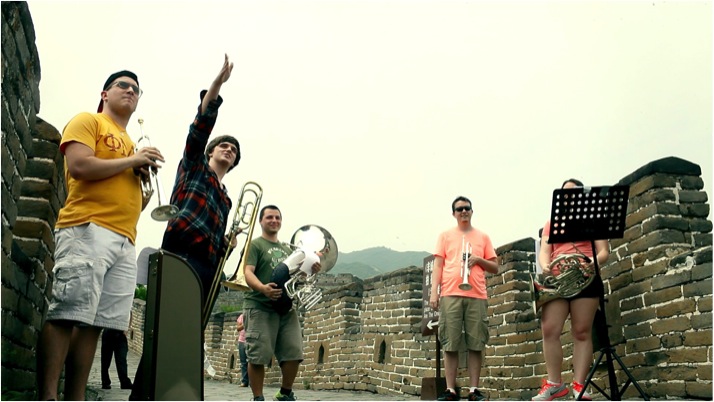 been exceedingly proud of the students and faculty in The Symphony at WKU when they
wowed four Chinese audiences last spring—on the stage and on the Great Wall!
been exceedingly proud of the students and faculty in The Symphony at WKU when they
wowed four Chinese audiences last spring—on the stage and on the Great Wall!
Honors College
Clearly the Honors College is a key dynamic in the pursuit of global learning. With more than 1,200 superior students with an average ACT of 30, the Honors College brings intellectual energy and strength to our classrooms and laboratories. It has made WKU the destination point for Kentucky's and some of the nation's best students. These students raise the intellectual level and standards for all undergraduates.
They serve as leaders throughout our campus. They study abroad. They earn the nation's most prestigious scholarships, fellowships, and awards. They drive all of our undergraduate colleges to develop honors courses, and they help us recruit top faculty and staff to our campus. When we made the decision to transition from an honors program to an Honors College, we began the process to enhance our academic reputation and draw national attention to this university.
Evidence of the growing academic reputation of WKU can be found on the Public University Honors website.
This website for the first time included WKU among its profiled public universities on the growing strength of our Honors College. This summer, Public University Honors recognized three institutions: University of North Carolina—Chapel Hill, University of Virginia, and WKU.
To quote Public University Honors, "The Honors College at WKU came to our attention while we were doing our regular review of the number of international prestigious scholarships won by public universities, such as Truman, Goldwater, and Fulbright awards.
We follow Goldwater awards closely because they are awarded only to undergraduate students in the STEM (science, technology, engineering, and math) disciplines. The undergraduate focus points to the level of research and faculty support that students receive in order to win the highly competitive Goldwater Scholarships. Since 2008, WKU students have earned 15 Goldwater Scholarships or Honorable Mentions. This would be a high level of achievement even for a top flagship university."
The article goes on to talk about our Chinese Flagship Program which is "only one of 11 such programs in the nation and how the Chinese Flagship Students have received in the last three years, two Fulbright Grants to China, nine U.S. Department of State Critical language scholarships, two David L. Boren Scholarships, three Benjamin A. Gilman international scholarships, and three Foundation for Global Scholars Awards."
The fact that our students are performing at this level in ways that we cannot have imagined just a few years ago is, indeed, a testament to the growing academic profile of WKU. This past year, a record number of WKU students and recent graduates were recognized in prestigious national scholarship competitions. To date, 34 WKU students earned recognition in these highly prestigious national and international award competitions.
These awards allowed our students to study in 12 countries with the best students in American higher education. Our compliments to the staff in the Office of Scholar Development and to all the faculty who serve as mentors to these students and help them prepare and compete and, when selected, optimize their international experiences.
HIGH ACHIEVING STUDENTS AND FACULTY
Other students who did big things include Kyle O'Donnell who won a $35,000 grant, which was the top award from "Idea State U", a Kentucky entrepreneurial competition. Kyle started Southern Kentucky Sock Company, a direct-to-consumer all natural sock company which makes socks with computer-readable QR codes sewn in to allow online reorders in the exact size, color and fabric. Kyle was also on our Enactus (formerly known as Students in Free Enterprise) team, which won their regional competition and went on to compete nationally.
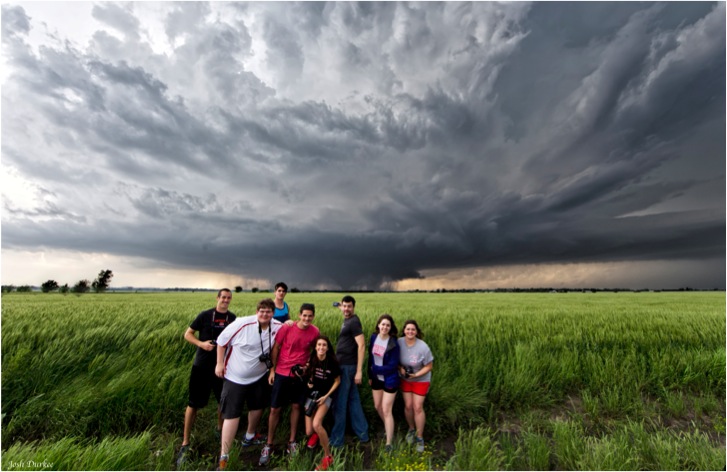 And how about our WKU Storm Chasers for documenting an EF-4 tornado this past May?
Eight students with two faculty members, Drs. Durkee and Dixon, travelled more than
7,000 miles across 10 states to apply various forecasting techniques with regard to
severe weather. They documented up to four confirmed tornadoes including an EF-4 near
Bennington, Kansas.
And how about our WKU Storm Chasers for documenting an EF-4 tornado this past May?
Eight students with two faculty members, Drs. Durkee and Dixon, travelled more than
7,000 miles across 10 states to apply various forecasting techniques with regard to
severe weather. They documented up to four confirmed tornadoes including an EF-4 near
Bennington, Kansas.
And, a shout-out to our WKU Academic Quiz Team with all four students returning for an encore season this year! Our academic quiz team finished 10th at the National Academic Quiz Team Intercollegiate Championship in Chicago in April. They were the highest finishing team among Kentucky universities and scored head-to-head victories over Cornell, Michigan, Ohio State, and Washington University among others. How about those Toppers!
Brian Chism, who will be a sophomore this fall, was elected state president of the Future Farmers of America at the Kentucky FFA Convention in June.
Brett Austin, a cross country and track student athlete, was awarded an NCAA post-graduate scholarship, a very competitive and highly prestigious national honor.
And not to leave our alumni out, tune in to ABC on Tuesday nights this fall to watch "Lucky 7" where 2002 WKU graduate Matt Long will star in the feature role. This is Matt's third lead role in a national network series.
And to our faculty, congratulations to Dr. Jie Zhang who was selected as a 2013 National Academy of Education Post-Doctoral Fellow; Dr. Julia Roberts for receiving the National Association of Gifted Children's Distinguished Service Award and for leading the World Conference on Gifted Education just two weeks ago in Louisville; to Brent Bjorkman who received the Archie Green Fellowship by the American Folklore Center at the Library of Congress; to Audrey Anton, Eric Kondratieff, and Beth Plummer in Potter College for earning highly competitive grants from the National Endowment for the Humanities; to Betsy Shoenfelt for receiving the 2013 Society for Industrial Organizational Psychology Distinguished Teaching Contributions Lifetime Achievement Award; to Jason Crandall for receiving the Distinguished Educator award from the Kentucky Association for Gerontology; to Melanie Eaton of WKU Aging who was advanced to Fellow of the American College of Health Administrators to Lisa Draskovic-Long, assistant professor of Dance, who was part of a team that placed fourth in the 2012 MoFILM Las Vegas contest; to Margaret "Peggy" Gripshover, associate professor of geography, who was appointed State Geographer by Governor Steve Beshear; to John Hardin, professor of history, who was reappointed to the Kentucky African American Heritage Commission by Governor Beshear; to Albert Meier, Ouida Meier and Scott Grubbs in Biology who received the Biological Diversity Protection Award from the state Nature Preserves Commission; to Jay Gabbard, associate professor of Social Work, who was named the Phi Alpha Honor Society National Advisor of the Year; to Monica Burke, associate professor of Counseling and Student affairs, who received the Howard Davis, Sr. award for outstanding service from the Southern Association for College Student Affairs; to Cheryl Beckley and David Brinkley, of WKU's Public Broadcasting Service, WKU PBS, who were recognized with three Ohio Valley Emmy Awards, and student Neil Purcell, who received a student production award; and congratulations also to Dr. Ching-Yi Lin for receiving both the local and national Jefferson Award, the latter of which was bestowed in Washington, D.C. in June. The Jefferson Award is for public service, and in this case, acknowledged Dr. Lin's service throughout our community for our pre-college strings program; to multiple faculty in our College of Science and Engineering, particularly in the Department of Chemistry, for mentoring students who received Research Experiences for Undergraduates (REU) support from the National Science Foundation in support of stipends for students engaged in the life and physical sciences.
In our case, we had eight papers published with REU students as coauthors, 29 regional and national conference presentations by REU students, and nine local and regional conference presentations by our REU students. What great graduate students and scientists these students will become! I also want to salute our Gordon Ford College of Business and our Accounting Department for both earning reaccreditation from AASCB-International this year. This is an outstanding accomplishment that only 178 institutions worldwide have achieved. To close out our recognitions—and I love the fact that we recognize these students every year—let's salute our School of Journalism and Broadcasting students who once again finished in the top five among all Schools of Journalism and Broadcasting programs in America as recognized by the William Randolph Hearst Foundation.
Our students had a first place finish in Multimedia and a third place finish in Photojournalism, placing fifth overall in the annual ranking of Schools of Journalism and Broadcasting. WKU has finished among the nation's top eight Journalism programs for 20 consecutive years while being ranked number one three times.
Congratulations also to our Forensics program, which won the national Lincoln Douglas Debate Championships while finishing second in the nation in both the American and National Forensics Association Championships.
And, finally, to our Civil Engineering students who won regional competitions in Steel Bridge Building and Robotics and competed nationally over the summer.
I apologize to those who won similar recognitions if I failed to include you. Let's give a big hand to all of our students, faculty, and staff who were regionally and nationally recognized this past year.
CHANGING FINANCIAL PARADIGM
I want to shift our attention now to a conversation about funding, enrollment, budget, and the shifting strategies which will shape our behavior for the foreseeable future.
State Budget
We are all aware of the difficult financial challenges in recent years. An improving Kentucky economic profile, I am hopeful, will mean we have reached an end of state budget reductions for a while, although it remains to be seen whether an improving state economy will result in any increased funding for higher education. Our approach is to do all we can to support a reasonable higher education funding model heading into the 2014 Kentucky General Assembly, which is expected to produce a state budget for the 2014-16 biennium. If a Higher Education budget gets traction and enhanced state funding is forthcoming, whether in the form of a performance funding model or whatever model may yet be determined, we are confident that WKU will earn a reasonable share of that Higher Education budget. We are performing well in most all of the anticipated performance measures, but with immense pressure on state funding for healthcare and pension reform, it is unlikely that significant new funding will be realized for the next couple of years. This is coming from the eternal optimist! Therefore, we have to assume, as we have in recent years, that we must control our own destiny and structure our own financial model to best meet our needs. In this regard, I want to describe for you some dynamics that will define us going forward, particularly relating to our enrollment profile in the future.
Enrollment
First, a bit of history. Between 1998 and 2008, we grew enrollment by over 40 percent—nearly
5,000 students. That growth produced substantial revenue, which we invested in academic
quality and campus infrastructure. 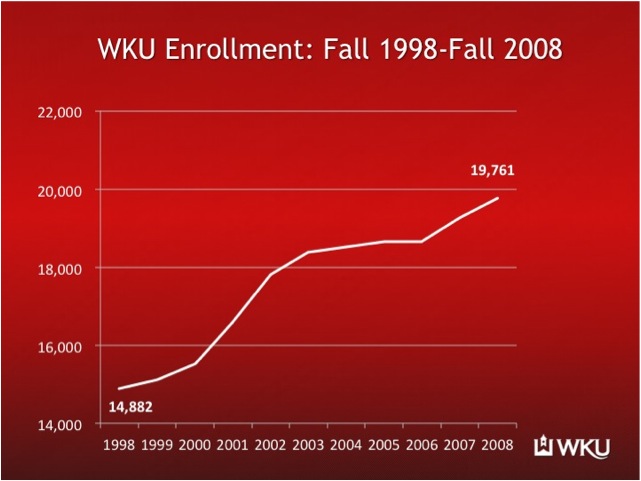 But, since 2008, we have had to absorb some $15 million in state funding reductions.
Growth served us well as a revenue strategy and helped us weather the storm of budget
reductions. It also created a revenue profile that is now far more dependent upon
tuition than any other revenue source in our budget.
But, since 2008, we have had to absorb some $15 million in state funding reductions.
Growth served us well as a revenue strategy and helped us weather the storm of budget
reductions. It also created a revenue profile that is now far more dependent upon
tuition than any other revenue source in our budget.
After decades of growth, college enrollment nationally dropped 2.3 percent this spring, compared with spring 2012, according to a report released by the National Student Clearinghouse Research Center. The decline is poised to continue. The number of U.S. high-school graduates peaked at 3.4 million in 2010-2011 and is projected to fall to 3.2 million by 2013-14, according to the Western Interstate Commission for Higher Education. Kentucky is projected to have a 6.1 percent decline in the number of high school graduates by 2020. An era of aggressive tuition increases and enrollment growth strategies that carried us from 1998 to 2008 cannot serve us well going forward. We have penetrated well the Kentucky market place, but the paradigm has shifted. The numbers in Kentucky just are not there in the future.
Over the last couple of years, we have implemented numerous models to enhance college preparedness among regional high school students. We have strengthened our own retention programs and redesigned our general education curriculum into a splendid Colonnade Plan, which ensures that the core curriculum teaches students to think critically, solve problems, and communicate effectively.
We have also strengthened our admissions policies to focus on better prepared students who are more likely to persist and graduate. We are seeing the first signs of success and indeed validation that these strategies are paying off.
As a result of our new admissions standards, we accepted about 500 fewer students this year than last. The average ACT score of this incoming class of students is up about a third of a point over last year which puts this class in the upper 40th percentile of all students taking the ACT. The average GPA is also up from 3.14 to 3.19. The overall quality measures show we are improving.
 But if we accept fewer students by choice in order to raise our standards and student
success rates while at the same time the total number of Kentucky high school graduates
begins to decline, we must adjust our strategies to ensure a stable financial profile.
There are two ways to do that: 1) recruit more international and domestic out-of-state
students who meet or exceed our new, higher admission standards; and 2) retain and
graduate more of the students we accept. We need to do both.
But if we accept fewer students by choice in order to raise our standards and student
success rates while at the same time the total number of Kentucky high school graduates
begins to decline, we must adjust our strategies to ensure a stable financial profile.
There are two ways to do that: 1) recruit more international and domestic out-of-state
students who meet or exceed our new, higher admission standards; and 2) retain and
graduate more of the students we accept. We need to do both.
Rather than targeting an enrollment of 22,000 or 23,000 students, as was our goal just a couple of years ago, we are now focusing our attention on a student population around 20,000, but with an enhanced revenue outlook because of better retention and a larger number of students paying out-of-state rates. This strategy will allow us to achieve an even better student-to-faculty ratio, particularly as we have every intention of increasing our numbers of full-time faculty in the future. Student success will be the key, and we all play a role in ensuring that our students—no matter where they are from—succeed.
So, to be somewhat repetitive, we will focus on admission of full-time, college-ready students; add value by increasing our non-resident and international enrollments, which is also key to achieving our vision of international reach; and by doing these things we will maintain financial stability and increase the overall quality of our student body.
To be clear, however, we will continue to strengthen our recruiting efforts in our Kentucky high schools and with our KCTCS partners. We must sustain the thousands of Kentucky high school graduates and transfer students who will always comprise the preponderance of the WKU student body.
Our regional campuses will be an increasingly important point of access for many WKU students. It is critical to ensure that all students coming to WKU are well-prepared and have the best opportunity for success, whether they are coming to us as first-time freshmen, or as transfer students with an associate's degree, or as adult learners who need a certification or to finish a degree.
Just as we must stabilize the revenue side of the budget, we must also be cognizant of the expense side. So, let me shift for a moment to employee benefits.
We have managed to maintain a stable health insurance program that still costs each WKU employee nothing for individual insurance premiums, while spouse and family plans do entail an employee-paid premium. We are, however, going to have to address changing variables in the coming year, which will likely impact our premiums. And, like all businesses, we will also have to manage the cost of the Affordable Care Act. The Human Resources staff and the Benefits Committee are working together on recommendations for ensuring a stable and competitive benefits package. As we approach the fall open enrollment period, we will plan a series of open forums to discuss the details and outline changes that are likely to take place over the next year or two.
As a self-funded insurance program, we are the insurance company. We all need to remain diligent in our efforts to manage health care costs by participating in campus wellness programs, being conscious of healthy lifestyles and daily habits, and yes, I will say it, let's refrain from smoking, eat well, and exercise.
CONFERENCE USA
Another rather significant event in the life of our university that will unfold in the coming year is the change in athletic conferences. This will be our last year of participation in the Sun Belt Conference where we have been a member for the last 32 years and have won far more championships than any other member. We have generated more NCAA revenue and produced more television coverage for the Sun Belt than all other members combined. Most importantly, our student athletes have led the way in academic performance, earning the 2013 Sun Belt Conference Graduation Rate Award.
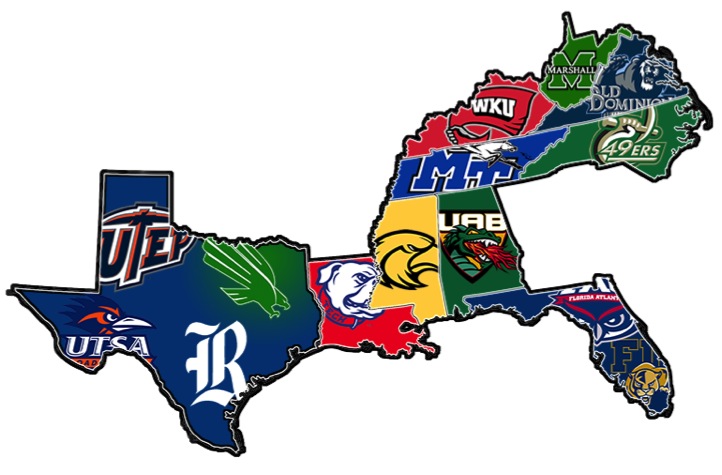
The average cumulative GPA for all 379 student athletes is 3.05, and 47 student athletes earned a perfect 4.0 last spring. Since 2008, 85 percent of all student athletes who have fulfilled their eligibility have graduated.
We have enjoyed our three decades of Sun Belt competition and have been proud of the value that we have brought to that conference.
As a member of Conference USA, however, we will enjoy enhanced television coverage, bowl opportunities, and revenue, and we will have closer geographic proximity to member institutions and better fan destinations. In Conference USA, we will reduce the travel required of our student athletes and the time spent away from campus.
We will also improve our chances for post-season competition for our 19 men's and women's athletic teams, and we fully expect to quickly rise to the top of Conference USA in the academic performance of our student athletes just as we have led the Sun Belt in all academic measures. One thing we will not do, however, as we depart the Sun Belt, is be guilty of poor sportsmanship. We will compete well and hard and salute our Sun Belt colleagues as we make our last trip through the Conference this year.
We will begin a gradual gearing up next spring with anticipation of our July 1 start date for Conference USA competition. The additional revenue generated by this new conference membership will help the Athletic program continue to achieve a balanced budget while paying for the inevitable cost increases associated with being nationally competitive across our athletic program.
TALENT: WHAT STUDENTS WANT; WHAT EMPLOYERS NEED
Students, parents, policy makers, businesses, and the news media talk a lot these days about higher education—the cost, student debt, graduation rates, employment. They want to know if we are properly preparing our graduates for the workplace. Are we responsive to the needs of business and industry? Are we developing the talent employers need now and in the future?
Many states have moved to an outcomes-based funding strategy that rewards graduation rates and other key measures of performance such as retention. We are certainly having that discussion in Kentucky—both in the legislature and among the university Presidents and the CPE. We have moved away from funding requests that are largely driven by enrollment numbers and toward a more performance-based, incentive-driven funding model. We are good with that line of thought. We are performing well in nearly all of the measures under discussion, but unfortunately, a performance-funding model only works if the state has money to devote to it. And, as we all know, that is a big if in this environment.
 But our ultimate and most important responsibility is to our students. And that's
where we must remain focused. We must ensure high value for the price, and student
success has to be our goal—because it's the right thing—the best thing—we can do both
for our students and for the communities we serve.
But our ultimate and most important responsibility is to our students. And that's
where we must remain focused. We must ensure high value for the price, and student
success has to be our goal—because it's the right thing—the best thing—we can do both
for our students and for the communities we serve.
Two recent articles, one by the Association of American Colleges and Universities and one in the Chronicle of Higher Education, suggest that what employers really want are students with a demonstrated capacity to think critically, communicate clearly, and solve complex problems. These articles also noted that more than 9 out of 10 employers said that it is important that job candidates demonstrate ethical judgment and integrity, have strong intercultural skills, and possess both the capacity and desire for continued new learning. Employers are telling us they want our students to understand real-world settings. They want students who can adapt to rapidly changing demands.
These studies also told us that college graduates were most lacking in written and oral communication skills and the ability to manage multiple priorities. They are looking for critical soft skills.
Last spring, I sat down with CEOs from the largest employers across our region. I asked them what they want in our graduates. They echoed the same sentiments. They want confidence, leadership skills, communication skills, strong work ethic, strong ethical values, and the drive to succeed. To the person, they said they could teach them the other skills that are needed to perform specific jobs. For the most part, good grades and a strong extracurricular résumé can suggest these kinds of skills, but a student has to be able to sell himself or herself based on experiences both in and beyond the classroom.
My point is this: Our Colonnade Plan general education curriculum is right on target. We need to teach our students to reason and communicate well across the curriculum.
We need to encourage second language study as early as possible. Our international strategies for cultural immersion are important to employers and to our nation's competitiveness and security. Technical skills are vital, particularly for our students in the life and physical sciences, as are qualities such as inquisitiveness, critical thinking, and the ability to work with a broad range of people.
These are important skills that are developed through rigorous engagement with the social sciences and humanities.
To me, when I hear "The Spirit Makes the Master," I think of the soft skills that employers are telling us that they seek—confidence, drive, energy, self-esteem. These personal traits in our graduates do not just happen by chance. So let's nurture those things that make WKU—and our students—distinctive. When combined with a strong grounding in one's discipline, they are what can set our graduates apart in the workplace and, not only help make them employable, but successful once they have entered the workplace.
What we do here matters. Higher education has great value. I fear this message is lost in this economic climate, particularly as we spend so much of our time and energy on revenue and budget issues. Let it not be lost here.
HELP STUDENTS PERSIST
Our objective is to graduate the students we accept. Our six-year graduation rate is still barely over 50 percent. Higher education has changed. Our financial model is dependent upon strong student retention. We must be completely dedicated to ensuring that students finish. We are a four-year college; therefore, we should do everything in our power to help students to understand the simple math: 15 hours a semester for eight semesters, 120 hours to graduate. Far too many of them are not completing those numbers. If history is an indicator, less than 75 percent of the new first-time, full-time students who begin classes on Monday will continue on to their sophomore year. If we can just raise that to 78 percent, that means several hundred more students will persist deeper into their WKU experience and are more likely to finish. There are vast differences in employment, earnings, and quality of life between students with no college, some college, or completed college degrees. So for their sake alone, let us push them to perform and graduate. But for our sake as well, strong student persistence is the key to our own financial prosperity.
One key initiative which is beginning to have an impact on our retention measures is called MAP-Works. MAP meaning Making Achievement Possible. MAP-Works is a survey that collects information on students' academic, social, and personal adjustment to college. If all of our students participate in this survey, then we could use the results to customize particular students' success strategies and directly link them to important student services and staff across campus. What we learn from these surveys helps us develop immediate intervention strategies that aid students not only in their transition to WKU but in how they address academic difficulties, homesickness, and a host of other concerns. I particularly call on faculty to remind your students to complete the MAP-Works survey. It will arrive in their Topper e-mail accounts on Monday, September 9. The data collected from this survey is only as powerful as the volume of students who participate. It is proven to be helpful, and it is one way we can achieve that 78 percent retention rate this year. Your help will be appreciated.
THE WKU SPIRIT
As we begin the school year with a new class of talent just embarking on their higher education journey, let's inspire and be inspired. They are high-achieving students from across our Commonwealth, our nation, and the globe. They have the highest average ACT of any previous WKU class; they are culturally diverse; they are better prepared for college; and they are receiving more scholarships than in past years—including a record number of minority scholarships awarded.
This will be an important year. We have to assume that our best opportunity for resources exist within our enrollment statistics. So let us continue to accept the highest quality student possible, redirect underprepared students to our joint programs with KCTCS, retain and graduate our students, and grow our numbers of out-of-state and international populations, all of which help us achieve our quality and financial objectives. We are 2,300 full-time employees strong. Working together, we can achieve our vision and strengthen the degrees we award.
You are the key. We are all in higher education because we value the opportunity to teach, study, mentor, inspire, and enrich the lives of others. Our responsibility is to create a campus environment where students can develop their talents and achieve their full potential.
I close this morning with this photo of a new sculpture just installed on our campus
last week. It is called "To the Point." It was sculpted by local artist, 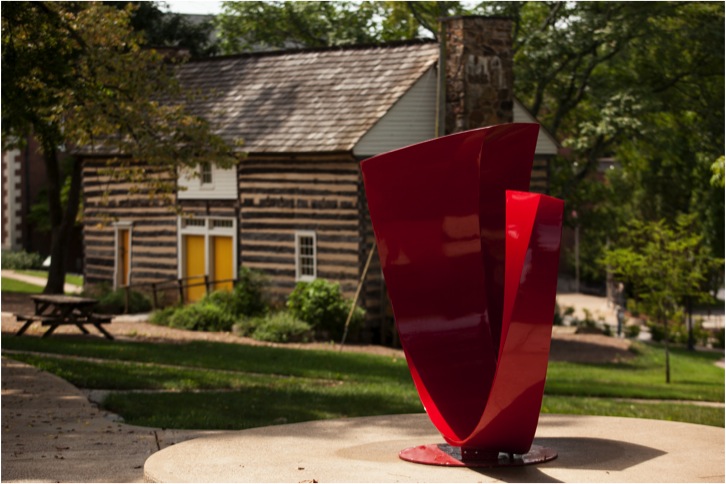 Donnie Firkins. We rescued it a couple of years ago from a site downtown where it
was rusting and deteriorating. Through a chain of events involving U.S. Bank and the
Crocker Law Firm, we received it as a gift, and Brent Oglesbee and his colleagues
in the Art Department went to work!
Donnie Firkins. We rescued it a couple of years ago from a site downtown where it
was rusting and deteriorating. Through a chain of events involving U.S. Bank and the
Crocker Law Firm, we received it as a gift, and Brent Oglesbee and his colleagues
in the Art Department went to work!
This is important for several reasons. It speaks to our values to preserve community landmarks. It speaks to the importance of art on our campus and in our lives And, the setting we chose for this sculpture—more than any location on our campus—speaks to our campus values for nature and history. Surrounded by trees and in the shadow of the Felts Cabin, "To the Point" symbolizes our spirit and a very special quality of life we enjoy here. So, find this new piece of art and enjoy it—just as we want every student to enjoy our shared campus home. Our quality of campus life is unparalleled. It defines, in large measure, our institutional personality. So, let's get "To the Point" and have a great year! Thank you.

WKU President Gary A. Ransdell
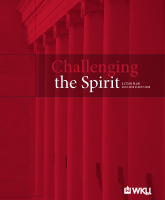
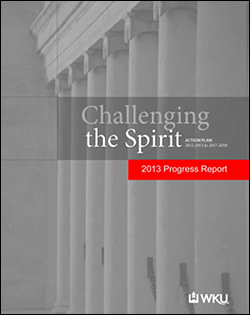
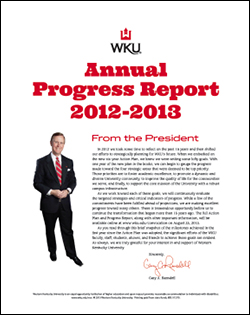
(View Image Gallery)
President's Award for Diversity
Faculty/Staff - Dr. Monica Burke
Student - Ms. Brittany Prather
Community - Ms. Shannah Banks
President's Award for Sustainability
Faculty/Staff - Dr. Jennifer Tougas
Student - Ms. Angela Briggs
Spirit of WKU Award - Mr. Jeff Younglove
Academic Awards
Teaching - Dr. Andrew Wulff
Research/Creativity - Ms. Lindsay Oesterritter
Public Services - Dr. Nancy Rice
Student Advisement - Dr. Fred Gibson
University Distinguished Professors
Dr. Kam C. (Johnny) Chan
Dr. Claus Ernst
Watch opening Convocation in it's entirety.